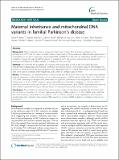| dc.contributor.author | Simon, David K. | |
| dc.contributor.author | Pankratz, Nathan | |
| dc.contributor.author | Kissell, Diane K | |
| dc.contributor.author | Pauciulo, Michael W | |
| dc.contributor.author | Halter, Cheryl A | |
| dc.contributor.author | Rudolph, Alice | |
| dc.contributor.author | Pfeiffer, Ronald F | |
| dc.contributor.author | Nichols, William C | |
| dc.contributor.author | Foroud, Tatiana | |
| dc.date.accessioned | 2011-02-22T00:28:53Z | |
| dc.date.issued | 2010 | |
| dc.identifier.citation | Simon, David K., Nathan Pankratz, Diane K. Kissell, Michael W. Pauciulo, Cheryl A. Halter, Alice Rudolph, Ronald F. Pfeiffer, William C. Nichols, and Tatiana Foroud. 2010. Maternal inheritance and mitochondrial DNA variants in familial Parkinson's disease. BMC Medical Genetics 11: 53. | en_US |
| dc.identifier.issn | 1471-2350 | en_US |
| dc.identifier.uri | http://nrs.harvard.edu/urn-3:HUL.InstRepos:4728744 | |
| dc.description.abstract | Background: Mitochondrial function is impaired in Parkinson's disease (PD) and may contribute to the pathogenesis of PD, but the causes of mitochondrial impairment in PD are unknown. Mitochondrial dysfunction is recapitulated in cell lines expressing mitochondrial DNA (mtDNA) from PD patients, implicating mtDNA variants or mutations, though the role of mtDNA variants or mutations in PD risk remains unclear. We investigated the potential contribution of mtDNA variants or mutations to the risk of PD. Methods: We examined the possibility of a maternal inheritance bias as well as the association between mitochondrial haplogroups and maternal inheritance and disease risk in a case-control study of 168 multiplex PD families in which the proband and one parent were diagnosed with PD. 2-tailed Fisher Exact Tests and McNemar's tests were used to compare allele frequencies, and a t-test to compare ages of onset. Results: The frequency of affected mothers of the proband with PD (83/167, 49.4%) was not significantly different from the frequency of affected females of the proband generation (115/259, 44.4%) (Odds Ratio 1.22; 95%CI 0.83 - 1.81). After correcting for multiple tests, there were no significant differences in the frequencies of mitochondrial haplogroups or of the 10398G complex I gene polymorphism in PD patients compared to controls, and no significant associations with age of onset of PD. Mitochondrial haplogroup and 10398G polymorphism frequencies were similar in probands having an affected father as compared to probands having an affected mother. Conclusions: These data fail to demonstrate a bias towards maternal inheritance in familial PD. Consistent with this, we find no association of common haplogroup-defining mtDNA variants or for the 10398G variant with the risk of PD. However, these data do not exclude a role for mtDNA variants in other populations, and it remains possible that other inherited mitochondrial DNA variants, or somatic mDNA mutations, contribute to the risk of familial PD. | en_US |
| dc.language.iso | en_US | en_US |
| dc.publisher | BioMed Central | en_US |
| dc.relation.isversionof | doi:10.1186/1471-2350-11-53 | en_US |
| dc.relation.hasversion | http://www.ncbi.nlm.nih.gov/pmc/articles/PMC2858137/pdf/ | en_US |
| dash.license | LAA | |
| dc.title | Maternal Inheritance and Mitochondrial DNA Variants in Familial Parkinson's Disease | en_US |
| dc.type | Journal Article | en_US |
| dc.description.version | Version of Record | en_US |
| dc.relation.journal | BMC Medical Genetics | en_US |
| dash.depositing.author | Simon, David K. | |
| dc.date.available | 2011-02-22T00:28:53Z | |
| dash.affiliation.other | HMS^Neurology- Beth Israel-Deaconess | en_US |
| dc.identifier.doi | 10.1186/1471-2350-11-53 | * |
| dash.contributor.affiliated | Simon, David | |


